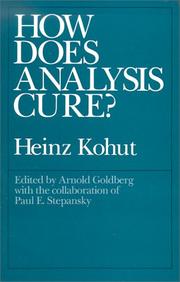Check nearby libraries
Buy this book

The Austro-American psychoanalyst Heinz Kohut was one of the foremost leaders in his field and developed the school of self-psychology, which sets aside the Freudian explanations for behavior and looks instead at self/object relationships and empathy in order to shed light on human behavior. In How Does Analysis Cure? Kohut presents the theoretical framework for self-psychology, and carefully lays out how the self develops over the course of time. Kohut also specifically defines healthy and unhealthy cases of Oedipal complexes and narcissism, while investigating the nature of analysis itself as treatment for pathologies. This in-depth examination of "(Bthe talking cure" explores the lesser studied phenomena of psychoanalysis, including when it is beneficial for analyses to be left unfinished, and the changing definition of "(Bnormal." An important work for working psychoanalysts, this book is important not only for psychologists, but also for anyone interested in the complex inner workings of the human psyche.
Check nearby libraries
Buy this book

Previews available in: English
| Edition | Availability |
|---|---|
| 1 |
zzzz
|
| 2 |
zzzz
|
| 3 |
aaaa
|
Book Details
Edition Notes
Bibliography: p. [229]-232.
Includes index.
Classifications
External Links
The Physical Object
Edition Identifiers
Work Identifiers
Source records
Scriblio MARC recordUniversity of Prince Edward Island MARC record
Internet Archive item record
Internet Archive item record
Better World Books record
Library of Congress MARC record
marc_columbia MARC record
marc_columbia MARC record
marc_nuls MARC record
Harvard University record
Harvard University record
Work Description
The Austro-American psychoanalyst Heinz Kohut was one of the foremost leaders in his field and developed the school of self-psychology, which sets aside the Freudian explanations for behavior and looks instead at self/object relationships and empathy in order to shed light on human behavior. In How Does Analysis Cure? Kohut presents the theoretical framework for self-psychology, and carefully lays out how the self develops over the course of time. Kohut also specifically defines healthy and unhealthy cases of Oedipal complexes and narcissism, while investigating the nature of analysis itself as treatment for pathologies. This in-depth examination of “the talking cure” explores the lesser studied phenomena of psychoanalysis, including when it is beneficial for analyses to be left unfinished, and the changing definition of “normal.”
An important work for working psychoanalysts, this book is important not only for psychologists, but also for anyone interested in the complex inner workings of the human psyche. [University of Chicago Press]
Community Reviews (0)
History
- Created April 1, 2008
- 18 revisions
Wikipedia citation
×CloseCopy and paste this code into your Wikipedia page. Need help?
| July 21, 2025 | Edited by MARC Bot | import existing book |
| December 27, 2024 | Edited by MARC Bot | import existing book |
| March 8, 2023 | Edited by MARC Bot | import existing book |
| January 9, 2023 | Edited by MARC Bot | import existing book |
| April 1, 2008 | Created by an anonymous user | Imported from Scriblio MARC record |











